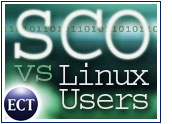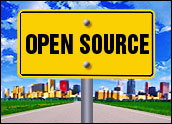
The SCO Group is amending its federal lawsuit against IBM, changing its legal tactics in the ongoing public drama over Linux software.
But contrary to some reports in the press, the company didn’t claim earlier in a letter that the Linux General Public License (GPL) was “unconstitutional.”
Rather, Darl McBride, the company’s CEO and president, claimed the GPL violated the U.S. Constitution by undermining intellectual-property rights.
Profit Equals Progress
“Developers who believe ‘software should be free’ cannot prevail against the U.S. Congress and voices of seven U.S. Supreme Court justices who believe that ‘the motive of profit is the engine that ensures the progress of science,'” McBride said in an open letter recently. “Our system of copyright laws is built on the foundation of the U.S. Constitution.”
McBride expanded on that theme in another letter, this time to members of the U.S. Congress.
“By taking action, our company has become a target for sometimes vicious attacks — including online attacks that have repeatedly shut down our company Web site,” McBride wrote in his letter. “Despite this, we are determined to see these legal cases through to the end because we are firm in our belief that the unchecked spread of open-source software, under the GPL, is a much more serious threat to our capitalist system than U.S corporations realize.”
Blake Stowell, spokesperson for Lindon, Utah-based SCO, did not return two phone messages — and an e-mail query — from LinuxInsider this morning, seeking additional comment.
Claims averring the unconstitutionality of an action are usually employed only against the government, as when someone’s civil rights are violated. If the government were infringing upon a company’s rights, it would have a valid claim of unconstitutional behavior. But reporters in the computer trades got this one wrong.
They should have stated simply that SCO alleged there were violations of the Constitution, not that the company claimed there was unconstitutional conduct. Perhaps the confusion generated by these ill-informed articles was one of the factors that motivated SCO to change its filing.
SCO’s Tactical Maneuvers
The company latest U.S. District Court filing against IBM over Linux demonstrates it is no longer even claiming that the Linux GNU-GPL license violates the Constitution. Last week’s filing, called SCO’s Answer to IBM’s Second Amended Counterclaims, does not state in court that “the GPL violates the U.S. Constitution.”
The move is tactical, as it attempts to block IBM from fighting on that turf and to discredit Big Blue’s overall argument. IBM is countersuing SCO in this matter, and SCO also is in court in a number of other venues against other technology organizations, according to news releases on its Web site.
AutoZone recently asked a court to put a hold on The SCO Group’s Linux lawsuit against it — a case that could have ramifications for any company using the open-source operating system. SCO litigated against AutoZone in March, claiming the auto-parts retailer infringed on SCO Unix copyrights through its use of Linux.
In its brief filed recently in U.S. District Court in Nevada, AutoZone argued the case should be “stayed” — delayed indefinitely — until there are results from three related SCO lawsuits that involve IBM, Red Hat and Novell.
“The resolution of each of these prior filed actions will significantly clarify, if not resolve, SCO’s claims against AutoZone,” the auto-parts retailer said in its motion. Legal issues — including the issue of Constitutional protection for software — have been heating up in the computing industry of late.
Amend It, Don’t End It
A recent speech by Eben Moglen, general counsel of the Free Software Foundation, indicates that those who favor open-source software are in favor of amending the Constitution.
“The copyrights clause in Article 1 Section 8 is only one of the many ways in which those rather-less-realistic-than-usually-pictured founding parents of ours participated in the great 18th-century belief in the perfectibility of the world and of human life,” said Moglen during the speech before a Harvard University audience. “The copyrights clause is a particular legal embrace of the idea of perfectibility through access to and the sharing of knowledge.”
Moglen, a law professor at Columbia University School of Law, said the 21st-century inheritors of that promise “live in a world in which there is some doubt as to whether property principles, strongly enforced, with their inevitable corollary of exclusion — this is mine, you cannot have it unless you pay me — whether property principles best further that shared goal of the perfectibility of human life and society based around access to knowledge.”
At the Free Software Foundation, the position has been for 20 years that to the extent that “existing copyright rules encourage the diffusion of science and the useful arts, they were good. And to the extent that they discouraged the diffusion of knowledge and the useful arts, that they could be improved,” he said.

















































I just re-read article 1, section 8, so I could make sure I was hearing Mr. McBride’s argument correctly.
To quote: "The Congress shall have power to lay and collect taxes, duties, imposts and excises, to pay the debts and provide for the common defense and general welfare of the United States; but all duties, imposts and excises shall be uniform throughout the United States;" … "To promote the progress of science and useful arts, by securing for limited times to authors and inventors the exclusive right to their respective writings and discoveries;"
In other words, nothing obligates Congress to mandate that all inventors receive monetary compensation for their work; congress is simply empowered to grant such privileges and rights to inventors as claim them. Inventors are free to do whatever they want with their products.
Mr. McBride’s comments seem to indicate that he believes inventors have no choice; that they -must- receive compensation.
Using to Constitution to make free things illegal? Pleeease! That sounds like using the Supreme Court to get elected President! (If, by chance, this is what happens… then make the software worth $1. Consideration for $1 is common practice in contract law. Then tell McBride to hit the road).
With all due respect, your statement that "[SCO] didn’t claim that [the GPL] was "unconstitutional[,]" [but only that it] violated the U.S. Constitution" is silly. It’s a distinction without a difference, because to be unconstitutional _means_ to violate the U.S. Constitution.
From dictionary.law.com:
"unconstitutional
adj. referring to a statute, governmental conduct, court decision or private contract […] which violate one or more provisions of the U.S. Constitution."
The claim that GPL is unconstitutional was made, but not in a letter. It was in SCOG’s court filings: a claim that SCOG has now explicitly dropped.